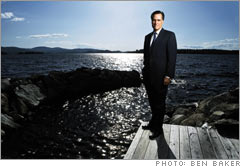Republican presidential candidate Mitt Romney rescued the scandal-plagued 2002 Winter Games in Salt Lake City, former baseball commissioner Peter Ueberroth ran the profitable 1984 Los Angeles Olympics and is chairman of the U.S. Olympic Committee, and Masters tournament chief Billy Payne helped Atlanta win the 1996 Summer Games over Athens, Greece, the Olympics' birthplace.
Each recently talked to The Associated Press about what Chicago should do to win its first Olympics and then host a successful Games. Their advice was simple: make friends on the International Olympic Committee, train many volunteers and don't do it for the money.
"I hope people don't think it's a big moneymaker and a source of economic development and good for business, because that's not what the Olympics is about," Romney said. "The Olympics is about an opportunity to serve the world and to welcome the world."
By the end, many felt the Salt Lake City experience became what Romney describes. But that happened only after a bribery scandal in the selection process shook the Olympic movement to its core, resulting in many of the changes Chicago must deal with in this revamped, and supposedly cleaned up, selection process.
And Atlanta? It was unwieldy, included a fatal bombing at Centennial Olympic Park and is largely considered the most over-commercialized Olympics in the history of the modern games.
Chicago is new to the Olympic selection process, and the Chicago 2016 organizing committee can learn plenty from both the successes and failures the three American cities experienced.
With USOC guidance, the Chicago group already has reached out to leaders of the 2012 London Olympics and the Athens and Barcelona Games, Chicago 2016 spokesman Patrick Sandusky said. And Romney met with Mayor Richard Daley during a campaign visit to Chicago in April.
The road to hosting the Games begins with getting to know people in the international sporting world and on the IOC, which Payne said was necessary for Atlanta because the Southern city wasn't well-known outside the United States.
"It occurred to us early on that coming out of the blue as we did virtually unknown ... that the best way that we could compete would be to secure the trust and the friendship of the respective (IOC) members and hoping in the process to convince them that we would be great custodians of this wonderful gift which they give every four years," Payne said.
For Chicago, which has some international recognition but is largely known for its past of gangsters and slaughterhouses, that means hosting international competitions and attending major events.
This week, Daley and a small delegation of the city's Olympic organizers are in Brazil at the Pan American Games in Rio de Janeiro - a chief rival of Chicago for the 2016 Games - where they will attend the opening ceremonies and watch events, Sandusky said.
About 5,500 athletes from 42 countries are expected to attend the Olympic-style Pan Ams, which begin Saturday and run through July 29.
For Daley, it's another chance to interact with IOC members, whose contact with bid cities has been limited by Olympic rules enacted following the Salt Lake City bribery scandal. A few days before he left for Brazil, Daley said he would talk up Chicago, its history and its diversity by touting "how great the people are, first and foremost."
"This city is a, really a secret throughout the world," he said.
Ueberroth said Chicago's high-profile mayor - whom he described as "shake your hand, make a promise, keep a promise" - is key to the city's efforts to build trust among the IOC members and eventually win the 60 votes needed to get the Games.
"They basically will vote for the people that they trust and that they know that are going to stay the course," Ueberroth said.
Other cities competing for the 2016 Games so far are Doha, Qatar; Madrid, Spain; Tokyo; and Baku, Azerbaijan. The IOC will pick a host city in 2009.
A recent misstep before the start of the Pan Am Games has Chicago organizers already trying to counter negative stereotypes about Americans.
A USOC worker last week scrawled the message "Welcome to the Congo!" on a board in the organization's Rio de Janeiro media center. The greeting, reportedly in reference to warm temperatures, was blasted by Brazilians, who didn't like having their country compared to a less-developed nation and viewed the Americans as arrogant.
The USOC apologized, and Sandusky said the Chicago delegation in Brazil was conscious of "being humble and listening."
Another issue Olympic host city hopefuls must address is whether they have the venues - or enough money to build them.
Chicago lacks some of the major Olympic facilities, including a $1 billion lakefront athletes' village and a $366 million temporary stadium. But Payne believes major construction isn't a big hurdle for a city like Chicago.
"I think that they would have confidence that the design, technological expertise that Chicago could bring to the task would be more than adequate to pull it off," Payne said, noting that Atlanta had to build a stadium and athletes' village, too.
Trouble over financing for a new stadium did complicate New York's bid for the 2012 Summer Olympics and the Games eventually were awarded to London.
Ueberroth said the government, private sector and community must come together as one to make the Games work. In Chicago, donors have raised millions of dollars to finance the city's bid, and the government has pledged millions more in financial guarantees in case the Games falter.
An Olympics can't happen without thousands of volunteers, and Romney, a millionaire businessman, said they should be treated like regular employees. Not everyone who applied to volunteer in Salt Lake City got a spot, and those who did went through rigorous training on both the work they would do and the attitude they should have.
"We tried to change the normal American attitude of, 'These are the rules and we're here to enforce them.' Instead it was, 'You were our guests; we're here to make sure you have a great time,"' said Romney, who described the Olympics as one of the great experiences in his life. "Any city who gets the chance (to host the Games) should be ecstatic."



